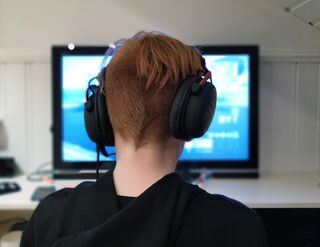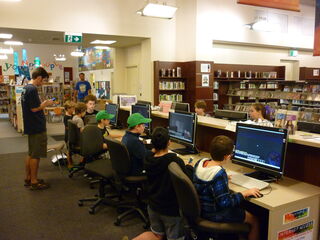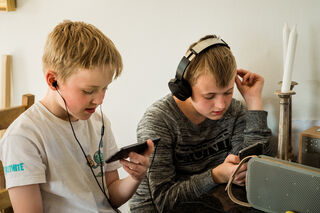ADHD
5 Quarantine Screen Time Activities for Kids with ADHD
How can you keep a kid with ADHD engaged this summer if they are stuck at home?
Posted June 29, 2020

Parents around the globe are worried about their kids’ health, family safety, financial strains, and the stress of 24/7 family “togetherness.” Parents of children with ADHD and other psychiatric concerns have an additional set of stresses, as managing the behavior of children with ADHD already requires parental superpowers. School is taking place at home, so don’t be surprised if you’ve begun to talk to yourself, having a "parent-teacher" conference. These additional stressors during the coronavirus quarantine call for the use of all of the tools at your disposal, which might include “gifting” your child a few additional hours to engage in quarantine recreational screen time activities.
Under normal circumstances, parents question whether they should allow screen time and video games for their children with ADHD. They often observe that their children with ADHD become overly focused on screen-based activities, sometimes having problems transitioning away from their technology or becoming irritable after playing. While these are legitimate concerns that need to be addressed, the intention and focus seen in screen-based play may provide a clue about how to help these kids learn. This is why in my work as a neuropsychologist, I often encourage parents to allow modest levels of screen time for children with ADHD.

Unfortunately, this interest can become all-encompassing and show the qualities of addiction. Children with ADHD who love technology may need their parents to moderate their technology use. Under normal circumstances, many of these parents can be unflinchingly restrictive about gameplay. Historically, psychologists have observed that children with ADHD become overly focused on what they find to be stimulating. Screens and technology are only the most recent areas of note for many of these children, and parents are rightfully concerned.
This level of engagement can offer parents of kids with ADHD a respite from the increased level of monitoring that is required during the COVID-19 quarantine. Children who are “safe” at home playing a video game are not breaking social distancing rules, bugging their siblings, or pestering their parents for attention that is already at a premium. More importantly, this engagement may provide insight into future educational and vocational opportunities where the symptoms of ADHD are less likely to interfere with their success. Parents may have a rare opportunity to compare their children’s focus on schoolwork compared to recreational screen time and learn about how to teach and reach them in a more effective way.
Here are some other thoughts about how parents might effectively use quarantine recreational screen time activities to help their children with ADHD:

Leverage interest in technology into other areas. Technology engagement can begin to build skills for future employment and lead to a greater sense of self-esteem in elementary and high school students. For example, children’s love of Minecraft could expand their interest in architecture, history, or construction, while those who love playing on the computer could learn basic programming skills or use tools such as Scratch, CodeMonkey, and Code.org.
Learn more about a variety of brain-training techniques. Check out the following slideshows and webinars that provide an overview of the research on many new tools that are available for children and adults with Attention-Deficit/Hyperactivity Disorder. Some of these slideshows will help you identify how to use video games more effectively as teaching tools for kids with ADHD.

Use video games to improve sustained focus, attention, and other executive functions. One of the best ways to help children with Attention-Deficit/Hyperactivity Disorder is to provide them with opportunities to improve skills that are useful at school and in other areas. Improving skills such as sustained persistence, planning, working memory, and task initiation can be key in helping children with Attention-Deficit/Hyperactivity Disorder. Video games can be helpful teaching tools as parents and educators assist children in recognizing how they use skills in games and how those skills could help them in the real world. They can also provide options for practicing skills.
Make game-based learning into real-world skills. While screen time can be a wasted opportunity for learning, using simple tools to improve metacognition and transfer of skills can make it productive. Mastery of many games and technologies requires executive-functioning and problem-solving skills. Children’s intense focus and persistence in gameplay amplify their capacity to learn, particularly when an effort is made to generalize game-based learning to real-world skills.

Recognize the risks of too much screen time for kids with ADHD. Some youngsters with ADHD would spend all their time playing Fortnite or Minecraft or watching YouTube videos if permitted. Obsession with and addiction to games and technology is, of course, a danger. Overuse of screens can lead to an unbalanced play diet in which children are not benefiting from physical, social, creative, and unstructured play. Make it a priority for these children to have ample time for exercise, outdoor activities, creative and unstructured play, and face-to-face interactions.


